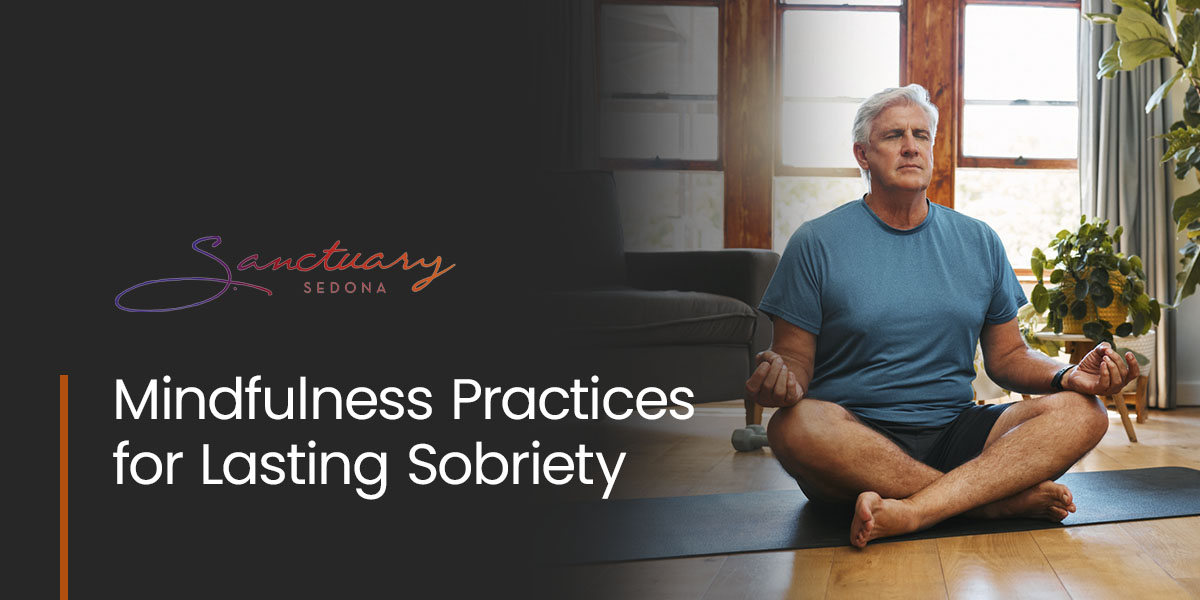The journey to recovery may feel daunting, especially when anxiety and overwhelming thoughts create feelings of uncertainty. To help you cope, practicing mindfulness can help you stay grounded and calm in the present moment. This powerful, evidence-based approach can help you manage difficult emotions, reduce stress and strengthen your ability to navigate your thoughts with clarity.
Incorporating mindfulness into your daily routine supports your well-being, fosters resilience and helps you remain sober when you struggle with anxiety. While it shouldn’t be the only tool to support recovery, mindfulness practices are crucial for maintaining balance and staying on the path to lasting sobriety.
Understanding Mindfulness and Its Benefits
Mindfulness is a practice that teaches you to observe your thoughts and feelings without judgment or reacting to them. It encourages awareness of your inner self and your surrounding environment, helping you manage your emotions, negative thoughts and anxiety.
Learning to sit with challenging thoughts and feelings can help you overcome reactive habits and unhealthy behaviors with compassion toward yourself. This is why mindfulness practices, particularly in the context of mindfulness and addiction, are valuable on the journey to long-term recovery.
The Science Behind Mindfulness in Addiction Recovery
Research in 2024 reviewed existing studies that effectively used mindfulness-based techniques to diminish addiction symptoms. Researchers proposed that mindfulness prompts neuroplasticity — the brain’s ability to form new neural connections, reorganize itself, and create adaptive functional and structural changes.
Since addiction is associated with maladaptive brain changes, specifically in its reward pathways and areas responsible for decision-making and impulse control, mindfulness and recovery practices help reverse maladaptive brain changes to aid in long-term recovery. They improve cognitive function by promoting the growth of new and healthy neural connections. Results revealed that mindfulness practices reduce cravings and help break the cycle of relapse. They enable individuals struggling with addiction to manage and reduce stress, aggression and symptoms of depression.
Another study in 2022 showed that mindfulness can be just as effective as medication for decreasing anxiety. It interrupts the brain’s negative feedback loop, where anxiety persists and makes people feel that worrying is rewarding. It lets you recognize that worrying is not good for you, providing an alternative sense of control. Mindfulness is also shown to decrease activity in the amygdala, the part of the brain that helps regulate fear and stress.
6 Mindfulness Practices for Lasting Addiction Recovery
The following are examples of mindfulness practices you can try.
1. Mindful Breathing
When stress or difficult emotions arise, focusing on your breath can bring you back to the present. Inhale deeply and notice the sensation of air filling your lungs, then exhale slowly while observing how your body relaxes. You can also count while breathing in and out to help you focus. This mindfulness technique helps calm you down and anchors your mind to the current moment. In the context of mindfulness for addiction recovery, it allows you to manage cravings and negative emotions.
You can devote 10 to 15 minutes of your day to uninterrupted, mindful breathing. You can do this in the morning, during your lunch break or anywhere you can sit and feel comfortable. The more you practice mindful breathing, the easier it is to feel calm and build a sense of control.
2. Body Scan Meditation
This practice involves paying attention to different parts of your body and noticing sensations without any judgment. You can begin by closing your eyes and focusing on your head, then moving down to feel through your body all the way to your toes. Tune into what your body senses, such as feelings of warmth, coldness, tension or relaxation. Then, slowly end the process by opening your eyes.

As you pay attention to your body, you ground yourself into the present — away from distractions and cravings. This mindfulness technique can also help you recognize early signs of discomfort or stress, allowing you to start calming down in the moment.
3. Observation Practice
Besides paying attention to your breath and your body, observing your surroundings is another way to practice mindfulness. Use your five senses to observe your environment and identify things you can see, hear, smell, touch or even taste. For example, you might gaze at the blue sky, hear kids playing by the park and notice the smell of trees in spring.
Practicing mindfulness helps you live in reality as it is rather than escaping it or imagining how it could be. Again, this exercise supports your mindfulness and recovery by grounding you in the present moment, promoting clarity and awareness when you might feel uncertain or anxious.
4. Urge Surfing Meditation
When a craving arises, instead of immediately reacting or suppressing it, you can try a mindfulness practice called urge surfing. This encourages you to observe your urge without action or judgment, allowing it to pass naturally. This practice is used as a relapse prevention technique rooted in mindfulness meditation, recognizing that cravings last for around 20 minutes.
By staying anchored in the present, you center yourself and “ride the wave,” noticing as the craving rises and falls. Urge surfing allows you to understand that cravings are temporary, which helps diminish its power. Practicing this often enables you to build resilience, empowering you to face cravings, knowing they will eventually subside.
5. Mindful Eating
Mindful eating is the practice of eating with intention, which helps you reconnect with your body and support long-term sobriety. Eating slowly and with intention encourages you to savor each bite and tune into your senses while consuming your meal. Over time, this allows you to identify true hunger from impulsive cravings and emotional eating, which fosters a healthier relationship with food and a better awareness of your body.
To integrate this mindfulness and recovery practice, start by creating a distraction-free environment while eating. Avoid things like watching television or scrolling on your phone. Have meals in silence and take your time chewing thoroughly. Notice your food’s flavor, smell, texture and how it makes you feel. Then, stop eating when you feel full. To slowly get used to this habit, try to practice mindful eating with one of your meals a day. This strengthens your sense of autonomy, helping you resist unhealthy cravings.
6. Stillness
Being still is a mindfulness practice that allows you to step away from constantly being busy in your life. It’s about creating quiet moments and giving your mind a chance to breathe. You can do this by deliberately slowing down, such as sitting quietly, walking slowly, or lying down on your couch or bed to eventually stay still. You can also lessen distractions by turning off any music or dimming lights.
Try to set aside time for moments of stillness to help you step back from things that cause worry. This practice helps support recovery by giving you time to reflect, which allows you to connect with yourself and ground your thoughts.
Start Your Journey to Long-Term Recovery at The Sanctuary at Sedona
Mindfulness can help you overcome anxiety and stay on the path of lasting sobriety. The Sanctuary at Sedona offers a holistic, multi-model, integrative approach to addiction recovery with therapies that do more than incorporate meditation or yoga into traditional treatment methods.
If traditional recovery programs fall short of addressing your needs, consider trying a new approach, such as mindfulness in addiction recovery, at The Sanctuary. Our residential treatment center provides approaches that include mindfulness meditation therapy, emotional self-regulation strategies and other helpful therapies that alleviate anxiety and build your confidence toward long-term recovery. We are dedicated to helping individuals heal their body, mind and spirit toward a healthier and meaningful life.
Contact us to learn more about our holistic approach to addiction treatment and begin your journey toward long-term sobriety.


